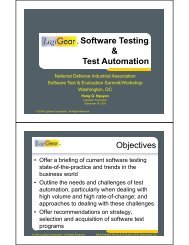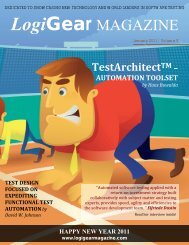LogiGear
February 2013 â The Rapidly Changing Software Testing ... - LogiGear
February 2013 â The Rapidly Changing Software Testing ... - LogiGear
Create successful ePaper yourself
Turn your PDF publications into a flip-book with our unique Google optimized e-Paper software.
11People - Skill, distributed/offshore tasks and trainingSkillsThe shift that is happening with people and skills today is aresult of ubiquitous computing and Agile development practices.The variety of skills test teams need today has expandedto the point that hiring traditional testers does notcut it in software development any longer. For this reason,many organizations have had to go offshore to find availableresources for projects.Increased skills are needed for all testing facets. New devices,platforms, automation tools, big data methods, andvirtualization all require new levels of expertise. Today, performanceissues with virtual machines (VMs) running androidemulators is a persistent problem. Automating thetest cases to run against the emulators on these VMs willrequire talented experts to sort out current issues andmaintain usable performance.We know distribution of testing tasks is successful and, atthe same time, needs more management oversight, greatcommunication infrastructure, increased use of ALM tools,and cross-cultural training.The Agile/Scrum move to co-located teams, balancedagainst both the cost and availability of skilled staff, is stillplaying out on most teams. What has been successful, andwhat I would advise any team looking for staff optimization,is to first distribute test automation tasks. The level of expertiseneeded to engineer new test automation frameworkscan be successfully separated from test design andjump start automation.SMEs (Subject Matter Experts)Not only do testers need to become more technical, allmembers of the team need to increase subject matter ordomain knowledge. Subject matter experts are still essentialbut they need to work together with other, more technicaltesting staff on test case design for automation, dataselection and additional tasks such as flushing out UserStory acceptance criteria and bug advocacy. Ultimately,super specialized test teams will evolve—with domain testersat one end and niche technical testers at the other.Many Agile practices espouse cross-functional teams. Whilethis is difficult or impossible for the vast majority of teams,testers need to grow their cross-functional skills to do morethan just execute test cases! Testers need to be multifunctional,whether that is helping with UI design, codereview,automation engineering or help/documentation.Many organizations today think of testers as software developerswho test.Fully DistributedInterpersonal SkillsWith the blending of work and home life- working hours tooverlap distributed teams, working in bull-pens/cross functionalproject team areas—people working from home, workingat a sustainable pace is a key eXtreme Programmingpractice.In the new software development paradigm, there is amuch closer relationship with product owners, customers,business analysts and testing. Development organizationsalways need more teamwork, seamless communication,trust, respect and all the other people skills that are essentialin a highly technical, distributed environment. Soft skilldevelopment is essential, not optional, to thrive in the rapid,distributed development world. Skills include: leadingtechnology workers, cross-cultural communications andusing ALM tools.TrainingLean development as a software practice is gaining manyfollowers today. One of the 7 Lean Principles is to amplifylearning. With the rate of technology, product, and developmentpractice change, it’s a no-brainer that there is a constantneed for training. For an in-depth view of training intesting, read our February, 2012 Training issue.ProcessWe live with global products and teams that are assembledfrom a globally distributed workforce. Skill, availability, cost,continuous work/speed—these are all driving organizationsto distribute tasks for optimal execution.Team ProcessSoftware development processes/SDLCs have changed inthe past 10 years like never before in the history of softwaredevelopment. The shift toward more metrics, more dashboardsand better measurement prevalent in the late 90sW W W . L O G I G E A R M A G A Z I N E . C O M F E B R U A R Y 2 0 1 3 ǀ V O L V I I ǀ I S S U E 1





